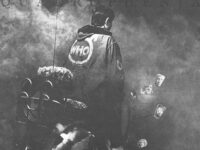The Who’s history is marked by turbulence and tragedy, full of smashed instruments, feedback, insane volume, inter-band fisticuffs, financial woes, substance abuse and death. And, as Mark Blake details in Pretend You’re in a War: The Who and the Sixties,, a new look at the band’s 1960s period, things were crazy right from the start.
Blake charts the band members’ upbringings and their earliest days as the Detours and High Numbers. But he focuses most of his attention on the years between 1965 and 1970, which saw the Who transform from the scrappy singles band of “Can’t Explain” and “My Generation” into purveyors of rock opera with Tommy. This narrow focus brings immediacy and excitement to the recounting of these crucial years. We see just how punk the early Who was, with its roguish managers Kit Lambert and Chris Stamp running up extravagant debts and Pete Townshend rushing into music stores to steal more guitars to smash.
The group’s chemistry — such as it was — remained volatile. Townshend was introverted and intellectual. Singer Roger Daltrey was extroverted and proudly working class. Bassist John Entwistle was stone-faced and dead quiet, yet musically brilliant — though living in Pete Townshend’s shadow. And drummer Keith Moon was, of course, a lunatic force of nature.
Yet, somehow all these competing forces joined to create some of the era’s best music.
Despite his macho outlook, Roger Daltrey brought tenderness and vulnerability to Townshend’s lyrics about adolescent alienation and insecurity. John Entwistle played bass as if it were the lead instrument, his virtuosic melody lines running this way and that as Keith Moon busily clobbered the drums, giving the songs manic energy and power. Pete Townshend held it all together with his blend of rhythm and lead guitar, slashing out power chords and taking solos that gave his contemporaries Eric Clapton and Jimi Hendrix a run for their money.
Mark Blake freshens up all the old stories: Moon hurls cymbals at Daltrey onstage; Daltrey punches Moon out in the dressing room; Townshend boots Abbie Hoffman off the stage at Woodstock; Moon blows up a hotel bathroom with fireworks. However, the author also fact checks some of the legends, and offers multiple perspectives on incidents where accounts differ.
Roger Daltrey, for example, insists Keith Moon drove a Lincoln Continental into a Holiday Inn swimming pool in 1967, but Pete Townshend and others say it never happened. Townshend insists that the Small Faces’ Steve Marriott — not Moon — was the first rock star to toss a TV from a hotel room window.
It’s all very lively, though Blake’s detailed focus on Lambert and Stamp threatens, at times, to derail the narrative. They were an interesting pair, no doubt, and are the subject of a recent documentary film. However, in Mark Blake’s Pretend You’re in a War: The Who and the Sixties, all the attention they get steals the spotlight away from the main attraction.
Blake has done new interviews with Pete Townshend and Roger Daltrey and many others involved in the band’s story. And, unlike previous Who histories, delves into the childhood abuse Pete Townshend suffered and how it unconsciously informed songs such as “A Quick One While He’s Away” and much of Tommy.
He also sets the ground for what happened later. We can see how this crazy R&B/pop band developed into the supergroup that created the epic classic rock of Who’s Next and Quadrophenia. It’s not the whole story, but enough of it. The book captures the essence of what the Who was, and what it became.
- ‘Dylan Disc by Disc,’ edited by Jon Bream (2015): Books - September 29, 2015
- ‘Pretend You’re in a War: The Who and the Sixties,’ by Mark Blake (2015): Books - September 9, 2015
- Here’s how the Beatles (almost) met Doctor Who - May 21, 2015




